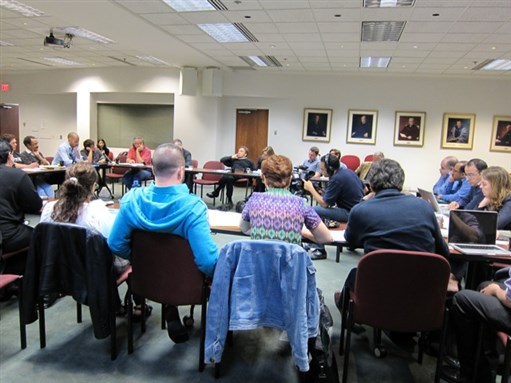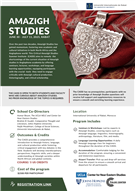Panel 4: Peripheries and Exceptions
The second day of the conference began with a panel that focused on states and issues that have been marginal to the dominant discourses about the Arab uprisings. However, the goal of the panel itself was to highlight the actual centrality of these issues to a deeper understating of these uprisings and their consequences for teaching the Middle East. Asli Bali, in her “Comparative and International Law of the Middle East After the Uprisings: Re-assessing the State of the Arab State,” highlighted the ways in which “law” is exceptionalized in Middle East studies and, in turn, how the Middle East is viewed as exceptional in legal studies. For her, there are three conceptual problems with the ways in which the Middle East is presented in legal studies (i.e., law schools): a lack of a regional paradigm for discussing law in the Middle East; the relevance of the Middle East within legal studies is restricted to questions of cultural relativism (i.e., Islam); the assumption that civil society is dormant and thus no domestic grassroots pressure in the region for human rights. Bali argued that the current uprisings challenge these conceptions and should be used to challenge their dominance. She concluded her presentation by highlighting the problematics the ways in which US law schools are engaged in shaping political outcomes for contexts they know little about, pointing to how academics and students were directly engaged the writing of the Iraqi constitution and how current students are being trained to write constitutions for other countries: possibly Egypt but certainly Bahrain.
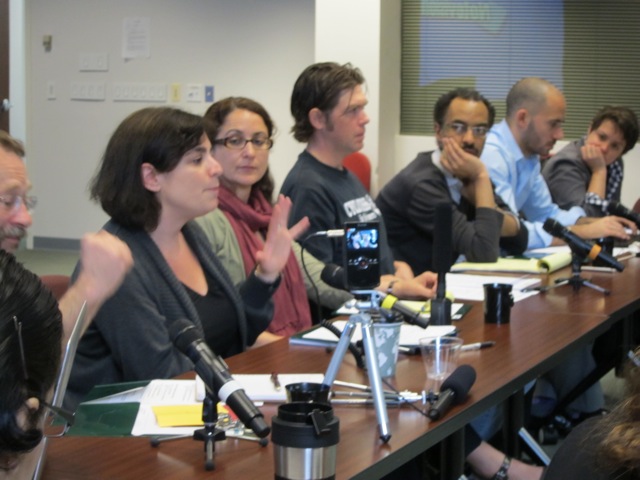
[Left to right: Joel Beinin, Asli Bali, Linda Herrera, Toby Jones, Khalid Medani, Ziad Abu-Rish, Maya Mikdashi]
In “Youth and Citizenship in a Digital Age,” Linda Herrera advanced the argument that in these discussions, we should not forget about the generational dimensions, specifically the dimension of youth. She highlighted the issue of culture and politics of schooling and questions both the emancipatory possibilities of different types of education as well as their functions as systems of control. For Herrera, an engagement with these questions forces one to consider two dynamics: the privatized/neoliberal education model and out-of-school learning via new communication technology and social media.
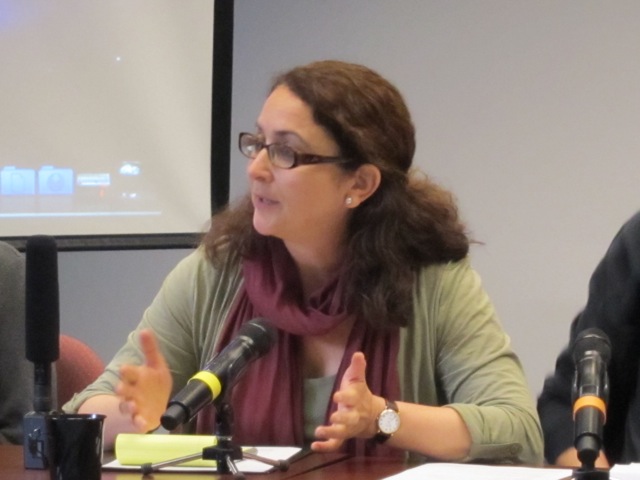
[Linda Herrera]
In “Democracy and its Limits in the Persian Gulf,” Toby Jones argued that while the outcomes of events in the Persian Gulf are still in the balance, the actions there are not peripheral to the region but at the very heart of the new trends towards counter-revolution in the region. He called for greater attention to this counter-revolution by looking at centers of power in the region and questioning what mobilizes regimes for counter-revolutionary violence. For Jones, developments in Bahrain speak to the heart of attempts to preserve the regional political and economic order on the part of Saudi Arabia and the United States.
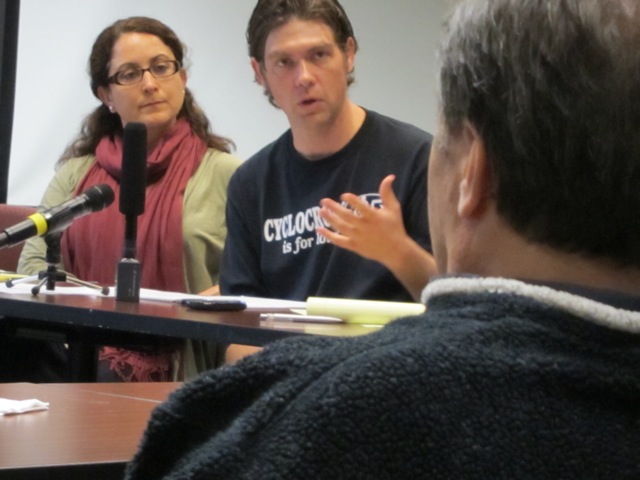
[Left to right: Linda Herrera and Toby Jones]
Khalid Medani’s “The Emergence of North and South Sudan: Reinterpreting the Politics of the Nile Valley in the Context of the Arab Revolutionary Movements” highlighted the lessons that could be learned from a deeper understanding and integration of Sudan. For him, Sudan has been anything but peripheral vis-à-vis the question of US interests and intervention (e.g., Darfur). Medani spoke to several areas of inquiry that a deep understanding of Sudan can shed light on: the only Sunni successful Islamist movement to capture the state; political Islam and democratization; identity politics and the problem of pluralism; international economics and the role of Islamic capital.
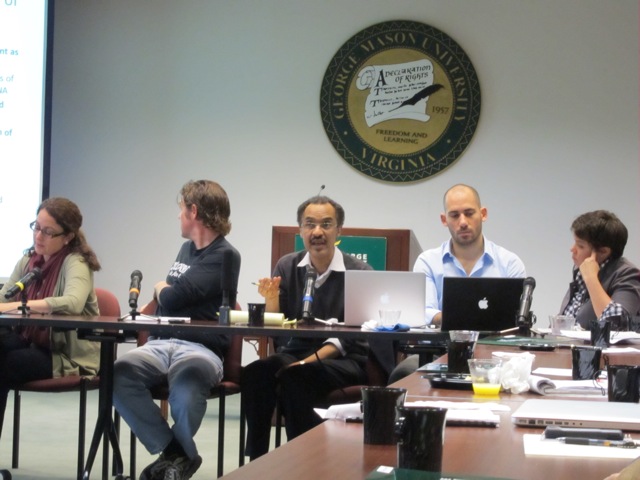
[Left to right: Linda Herrera, Toby Jones, Khalid Medani, Ziad Abu-Rish, Maya Mikdashi]
Ziad Abu-Rish, in his “Regional Uprisings and Middle East Scholarship: Some Thoughts on What We Can Do Better,” highlighted how disparities in our understanding of the uprisings are reflective of gaps in the available literature on different parts of the Middle East (e.g., Egypt and Tunisia vs. Libya and Yemen). He also discussed the need to move toward a deeper understanding of the variables that inform regime actions (e.g., violence, concessions, cohesion, etc.) in the face of the uprisings as opposed to simply relying on simplistic predictions related to the types of violence a particular leader is perceived to be willing to deploy. Abu-Rish concluded his presentation by stressing the need for historians to pay more attention to the early independence period of Middle Eastern countries and thus have a stake in debates about the legacies of state building and various political/institutional configurations that inform contemporary dynamics.
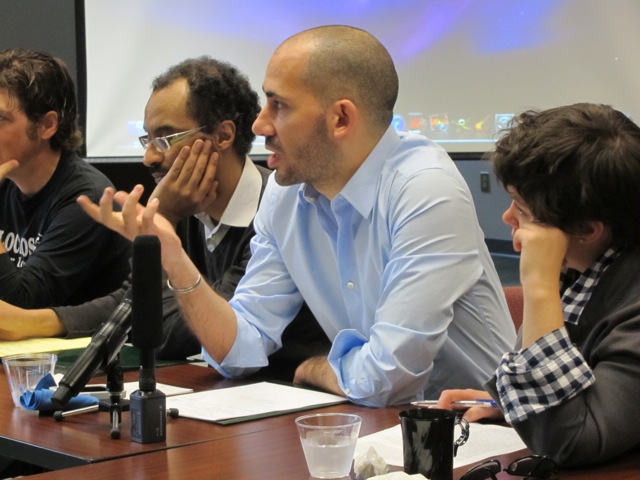
[Left to right: Toby Jones, Khalid Medani, Ziad Abu-Rish, Maya Mikdashi]
In “Teaching the Middle East After the Revolutions: Critical Perspectives,” Maya Mikdashi focused on what she viewed as the underestimated power of neoliberalism. For her, a focus on the uprisings as simply a reaction to and critique of neoliberalism focuses only the economic aspect of neoliberalism. Mikdashi highlighted the ways that critiques of market-based restructuring of the economy (i.e., appeals to human rights) are themselves implicated in neoliberalism’s role not just as a market-structuring discourse but also a subject forming discourse. In this sense, she is critical of the split in the field of Middle East studies between those that study the economy and those that study the subject, calling instead for a more nuanced and sophisticated analyses.
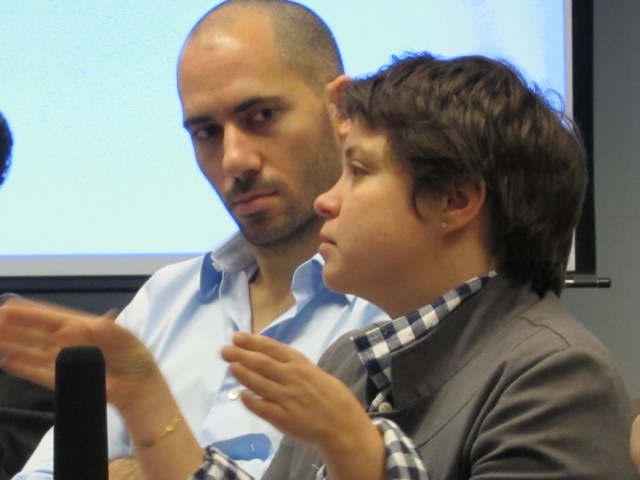
[Left to right: Ziad Abu-Rish and Maya Mikdashi]
Panel 5: Teaching About Identity and Religion
This panel addressed the challenges and opportunities that the Arab uprisings posed to the teaching of religion and identity in the Arab world. As’ad Abu Khalil began with “Teaching Arab Identity and Islam in Light of the Arab Uprisings,” a presentation that focused on how the uprisings in Egypt and Tunisia provided educators with an opportunity to think and teach Arab nationalism and leftist political thought. He pushed participants to think critically about how academia had reproduced the trope that both of these discourses are no longer politically relevant.
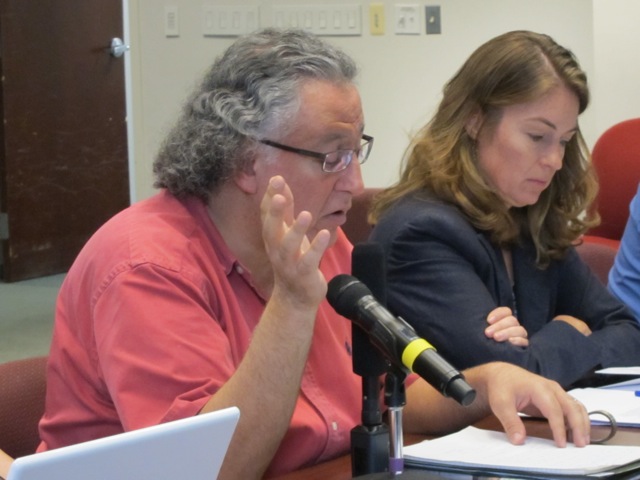
[Left to right: As`ad Abu Khalil and Michaelle Browers]
Michaelle Browers, in her “Teaching Political Islam after “Post-Islamism” and the Arab Revolutions,” continued and expanded on this theme, offering examples from her own classroom pedagogy in courses on Arab political thought and Political Islam. She urged educators to pay more attention to the broader history of political thought in the Arab world and political Islam`s place within (not above) it.
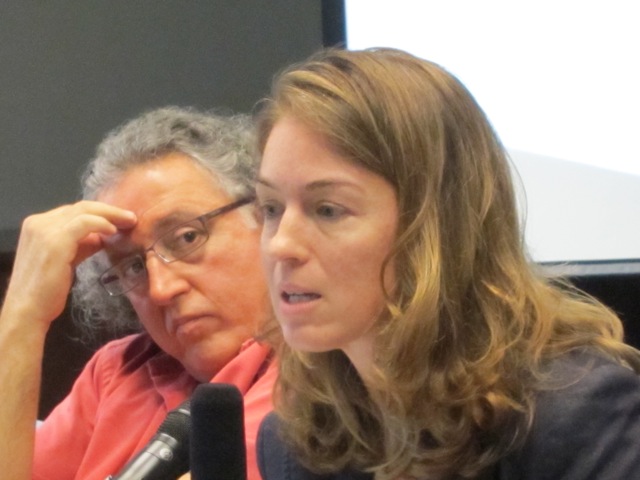
[Left to right: As`ad Abu Khalil and Michaelle Browers]
Further challenging the ways in which the politics of the Arab world is conventionally taught, Laurie King’s “Reconsidering Muddles in Middle East Models: the Utility of Ethnography in Pedagogy, Theory-Building, and Public Debate” discussed the importance of using ethnographic texts to expose students to both political discourses and practices. King also discussed how the dominant themes in anthropological writing have yet to be challenged significantly and she questioned anthropology`s recent entanglement with security studies via the Human Terrain Project.
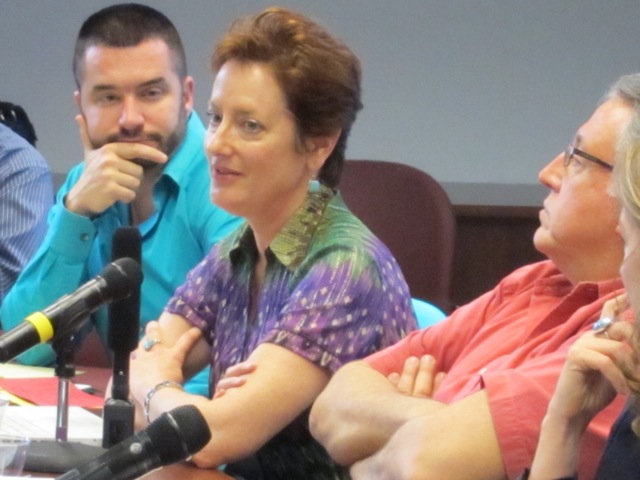
[Left to right: Paul Amar, Laurie King, As`ad Abu Khalil]
Finally, Hayrettin Yücesoy, in his “Revolutions and Teaching the Middle East and Islam,“ concluded the panel with a critical discussion of the ways that the history of the Middle East is over-determined by the history of Islam.
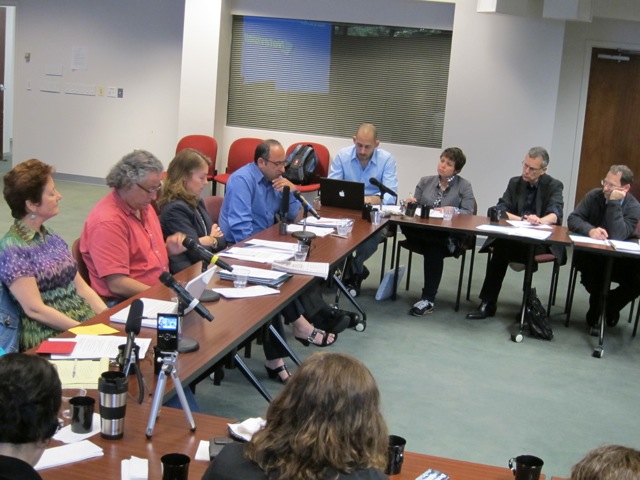
[Left to right on left side of photo: Laurie King, As`ad Abu KHalil, Michaelle Browers, Hayrettin Yucesoy. Left to right on top part of photo: Ziad Abu-Rish, Maya Mikdashi, James Gelvin, Joel Beinin.]
Lunchtime Talk by Adel Iskandar
Between the final presentations panel and the first concluding discussion, Adel Iskandar presented a lunchtime talk, "The Arab Media: Unlearning while Teaching on the Arab Media."
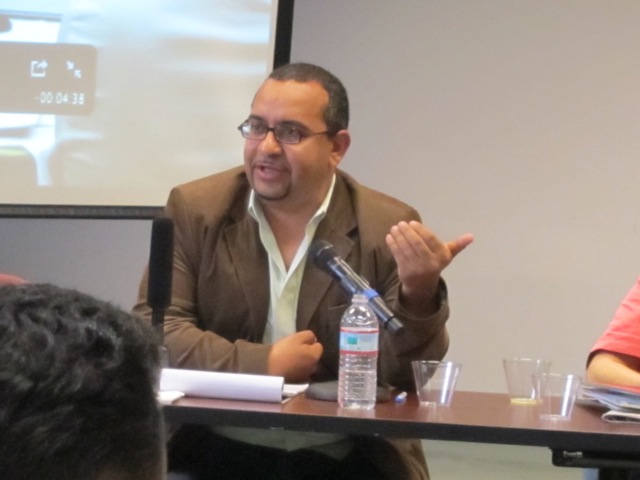
[Adel Iskandar]
Closing Discussion 1: Research Agendas
This was the first of two panels intended to gather up the important themes and ideas of the conference and to raise questions and suggestions that would help to set the agenda for future work. This attempt was framed by two questions: How should we distinguish the current discussion from those that the field of Middle East studies seems to have every ten years or so in terms of developing new approaches and responding to current events? What is distinctive about this particular moment, and what are the particular opportunities available to us in formulating research agendas today?
The moderators, Bassam Haddad, Jason Brownlee, and Lisa Hajjar, began by summing up what they saw as some of the major themes raised during the conference: issues of disclosure and conflicts of interest for scholars in the field (with the concrete suggestion that scholars disclose the names of organizations from which they receive honorariums or consulting fees); the question of speaking about power, and to whom (if we want to change U.S. policy towards the Middle East, should our aim be to get heard in the halls of power in Washington, or to direct our voice towards a larger public who would in turn be able to make demands for these changes of policy); and the particular challenges posed by, and to, the field of political science.
Three main clusters of issues were raised for further discussion and as a focus for future research agendas: (1) returning to or revisiting approaches grounded in political economy, as a way to address issues such as neoliberalism, counter-revolution, contentious politics and social movements, and questions related to subjectivity, agency, and institutions; (2) issues of law, war, and revolution, including questions related to human rights, international institutions and enforcement, accountability, police power, state “building” and destroying, and constitutionalism; and (3) major questions regarding how to frame our unit of analysis: should we be satisfied with “the Middle East” as a unit of analysis, as compared to, say, “Arab politics” or “the Islamic world” or other possible categories?
The wider discussion picked up on a number of these themes. There were several comments that addressed the role of the intellectual and the question of who we should be addressing. One interesting conversation involved the question of how power shapes policy: one suggestion was that “power makes people stupid,” and that our role should be to demonstrate that we can make better sense of events on the ground; a contrasting perspective was that those with power are well informed but have different goals and a different sense of what a “rational” foreign policy is, and so our job is to try to push the public discussion rather than try to change the minds of policy makers. It was also suggested that we think about ways of directing our research to colleagues from other disciplines, especially those who may begin teaching issues related to the Middle East in light of recent events.
Another set of discussions was around a recurring theme from the conference: the relationship between approaches grounded in political economy and those grounded in what might be called discourse analysis or issues of representation. There seemed to be a general consensus that a future research agenda should attempt to bring together both approaches and see the value in each, although the consensus also seemed to be that in a lot of recent work, issues of representation had somewhat sidelined political economy (thus the calls for a return to political economy). There was also a call to add the generational dimension, specifically the study of youth and youth culture, to our framework of analysis.
The value of thinking about current events through the framework of “revolution” was also a topic of discussion; one suggestion was that the debate about whether any particular set of events is “really” a revolution or not might be transformed into questions such as where state agents have been replaced by other agents, or how the regime yields to various social forces. There were suggestions that we might look for points of historical comparison (for example, Egypt in 1919), but also cautions about the ways in which misleading historical analogies (the question of whether any particular event is analogous to 1848, 1919, 1946, 1979, etc.) can lead to unproductive frameworks for actually figuring out events on the ground today.
There were several responses to the question of new research opportunities opened up today: for example, it was suggested that this might constitute an important research moment in the sense that new opportunities for data collection may be opened up by the revolutions and uprisings themselves, allowing researchers to depend less on data collected by governments and organizations. Also raised was the possibility of focusing critically on the (misleading) data produced by bodies like the IMF and World Bank as a way to challenge positivist approaches in political science.
Several participants pointed to some of the gaps in the discussions that might be addressed in future conversations and research agendas: for example, there had been little discussion of Tunisia and the role of the Tunisian Revolution; the debates regarding Libya, in particular debates between Libyan scholars and intellectuals and members of the U.S. and European left, had also not been a major focus; and there had not been much discussion of Palestine, leaving open the question of how previous intellectual and political paradigms for thinking about Palestine (such as settler colonialism) might be addressed in our new research agendas.
The panel ended with several questions that may be crucial to setting future research agendas: How do we take account of and address the open-endedness of ongoing events, and the seemingly arbitrary processes that have led to some of these events? In calling for a focus on political economy, are we assuming that the recent uprisings/revolutions have been driven by factors related to political economy, and are we comfortable with this assumption, or is more research needed to determine this? Finally, in making suggestions for our future research agendas, to what extent are we driven by a sense of things that just need to be addressed by the field in a general sense, and to what extent are we driven by the need to find a way of focusing specifically on current and ongoing events in the region—and to what extent do these two needs come together, or not, in the issues we have raised throughout the conference?
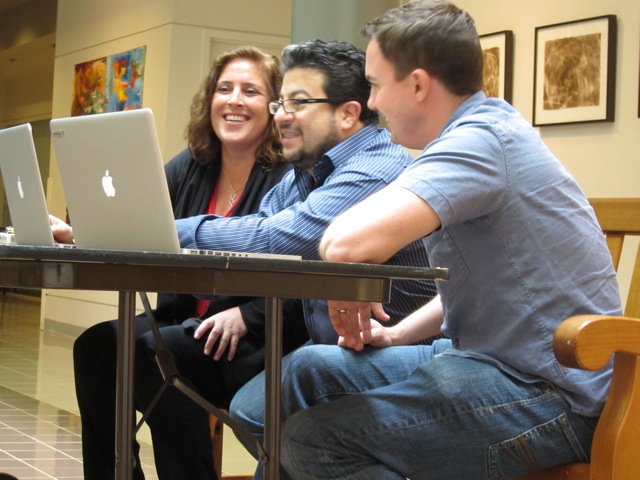
[Left to right: Lisa Hajjar, Bassam Haddad, Jason Brownlee]
Closing Discussion 2: Pedagogy and the Classroom
This was the second of two panels intended to gather up the important themes and ideas of the conference and to raise questions and suggestions that would help to set the agenda for future work. The moderators, Pete Moore and Michaelle Browers, began by gathering up what they saw as some of the major themes raised during the conference. These clustered around four main topics: ideas and strategies for moving beyond Orientalism as a way of structuring our pedagogy; evaluating our ongoing and traditional approaches and initiating new approaches; transforming notions of teaching and classroom practice, and re-imaging our roles as educators in light of the recent revolutions and uprisings; and generating new techniques and strategies for the classroom and beyond.
1) Moving Beyond Orientalism: In terms of meeting the conference’s stated goal of moving beyond “defensive” approaches to teaching the Middle East, one set of issues involved trying to think about ways of getting past simply challenging Orientalism, and instead finding more transformative approaches to pedagogy. How, for example, can we find ways of moving beyond simply teaching what the west wishes to know about the Middle East, and move towards teaching about the culture, politics, and communities of the region on their own terms?
2) Approaches Old and New: Moving forward, how can we find institutional spaces and opportunities for introducing new topics and classes, rather than trying to squeeze new approaches into existing curricula or trying endlessly to put new spins on old classes? On the other hand, how can we critically evaluate our pedagogical tools in order to more effectively know what needs to be retained from the past, what needs to be revised and revisited, and what may need to be jettisoned altogether?
3) Transforming Notions of Teaching: What are the roles we wish to play as educators, and how do we determine and establish our pedagogical goals when it comes to teaching the Middle East? How do we adapt our teaching methods in order to better face various forms of institutional challenges: for example, teaching undergraduates within general humanities courses versus teaching specialized graduate courses versus teaching more “professional” oriented courses for students looking to get into politics or diplomacy or intelligence work? How do we formulate our roles as educators in order to better foster future commitments and create new forms of solidarity — in short, in order to be transformative intellectuals?
4) Techniques and Strategies: How do we begin to evaluate our best practices and generate new ideas for bringing the issues discussed at the conference into the classroom? How do we begin to approach the ethical issues raised by new institutional practices — for example, the deeply disturbing ethical issues raised by many study abroad programs set up in the region by U.S. universities? What is the role of the “virtual classroom” — does it really help to link students in different locations, or does it mostly function to indulge certain exoticist curiosities on the part of western students? How can we best use new media technologies and other visual media to meet our pedagogical goals when it comes to teaching the Middle East? How do we address the new forms of campus and classroom politics that will come into existence in the future, and are there opportunities to link these to the political and cultural activities of youth movements in the region?
The discussion that followed picked up on many of these issues. A number of participants talked about the importance of developing strategies for working with new forms of technology, including social media and visual media, in the classroom. The importance of focusing on ethical issues was also a recurring theme: for different participants, this was emphasized as a way for thinking about and dealing with institutional politics, our relationship to students, ways of thinking about the desired “outcome” of our pedagogy, and more generally, the ways in which we as educators could play a part in both introducing students to important analytical frameworks and also playing an active role in transforming the way the region comes to be understood. The importance of addressing these and other issues within graduate programs was emphasized, both because graduate students are grappling with these issues in their own research, and because they are being trained to be the next generation of educators that will be carrying these questions in their classrooms. And, as one participant noted, there was, in light of the changes occurring throughout the region, the need for us all to rethink not just the form of our teaching but also the content of our classes in order to address the new situations that are continuing to emerge.
We at Jadaliyya, along with Arab Studies Journal, would like to extend our sincere appreciation to the Ali Vurak Ak Center for Global Islamic Studies and the Middle East Program, both at George Mason University, without who`s financial and logistical support, the conference would not have been possible.
Click here for the Introduction to Jadaliyya`s "Teaching the Middle East" conference.
Click here for Panel Summaries of Day 1 of Jadaliyya`s "Teaching the Middle East" conference.
Click here for Conclusion to Jadaliyya`s "Teaching the Middle East" conference.
